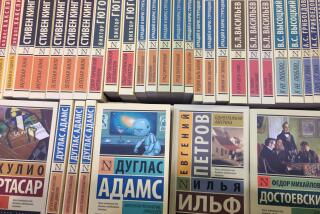Chernobyl Fallout Evident in Russian Immigrants
- Share via
NEW YORK — Slava Polovetsky is going bald.
That is not unusual for middle-aged men, but Slava is just 6 years old. Patches of his brown hair have turned gray and white. His right eyebrow and eyelashes fell out and have grown in white as well. His right eyelid does not fully open.
Before Slava and his family emigrated, Russian doctors told his mother that she had been exposed to radiation from the 1986 explosion at the Chernobyl nuclear power plant while she was pregnant with her son. They said there was a strong possibility that Slava could develop cancer.
Now Slava is one of the estimated 100,000 immigrants from the former Soviet Union since 1987 who have settled in New York City, mostly in the Brighton Beach section of Brooklyn known as “Little Odessa.”
No reported cases of cancer in the United States have been related solely to the Chernobyl disaster, but Slava could become a symbol for the future if more Russian immigrants get sick. Epidemiologists simply don’t know what the long-term effects of exposure to low-level doses of radiation might have on the immigrants.
“Some say that there will be 3,000 new cases over the next 70 years,” said Dr. Andrew Davis, a Chicago-based doctor who has cared for many Russian immigrants. “Others say more than 100,000 cases. It is hard to say precisely what effect Chernobyl will have.”
What is clear is that the real damage from Chernobyl so far has been psychological.
Anxiety and the fear of getting cancer plague most immigrants. These anxieties are amplified by a cultural mistrust of doctors and the medical profession.
“Most Russians are confused about the quality of medical care over here as compared to the quality of care over there,” said Sam Rausman, a social worker who deals only with Russian immigrants at Maimonides Medical Center in Brooklyn. “They were told the U.S. system is not good.”
Even though they don’t trust the American health care system, most Russians still seek care. They believe that any information doctors can give them about their children’s chances of getting cancer is better than no information at all.
“For those who lived in the Chernobyl area, it is important that they see an endocrinologist,” Rausman said. “That is one English word they know already. They want to know if children have developed any conditions because of the radiation.”
“I think all the time about what this has done to my son and my daughter,” said Slava’s mother, Klavdia. “She developed psoriasis after the plant exploded, and I worry that my son will get worse. But what can the doctors do for them?”
“The American health care system is not prepared for these immigrants,” said Dr. Anatoly Belalovsky, an attending physician at Maimonides’ outpatient clinic, which treats about 17,000 Russians a year. These immigrants have what he called psychological morbidity.
“The level of stress is off the charts,” he said. “We see a large percentage of children with bed-wetting. And many immigrant children have tics or twitches that rack their bodies.”
In addition to this stress, Russians have a cultural wariness, ingrained after experiencing poorly trained doctors, inadequate and antique medical equipment and a lack of proper medicine.
“Chernobyl doesn’t even make the top 10 list of medical problems,” Belalovsky said. “The Russians are widely under-vaccinated and misfed. We are looking at problems, and radiation-induced illnesses are not high on the priority list.”
More to Read
Sign up for Essential California
The most important California stories and recommendations in your inbox every morning.
You may occasionally receive promotional content from the Los Angeles Times.










